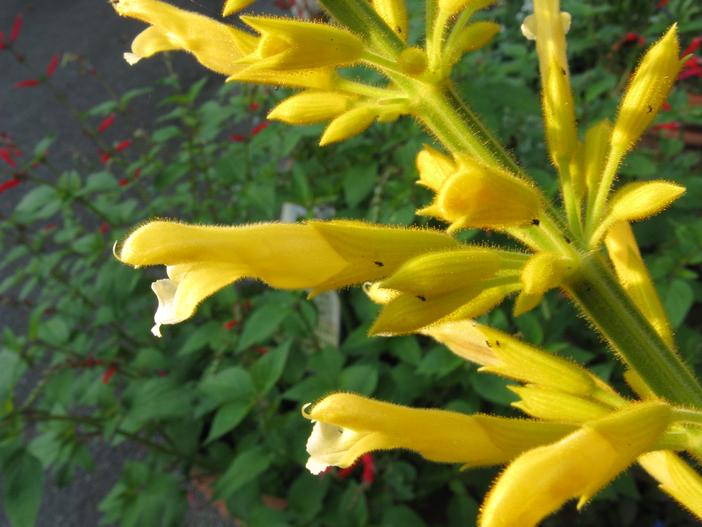Forsythia Sage
(Salvia madrensis)
Forsythia Sage (Salvia madrensis)
/
/

KENPEI
CC BY-SA 3.0
Image By:
KENPEI
Recorded By:
Copyright:
CC BY-SA 3.0
Copyright Notice:
Photo by: KENPEI | License Type: CC BY-SA 3.0 | License URL: http://creativecommons.org/licenses/by-sa/3.0/ | Uploader: KENPEI | Publisher: Wikipedia Commons















Estimated Native Range
Summary
Salvia madrensis, commonly known as Forsythia Sage, is a perennial shrub native to the cloud forests and pine-oak woodlands of Northwest Mexico. It typically grows to a height and width of 6 feet (1.8 meters). This plant is characterized by its upright form and numerous 12-inch inflorescences that boast softly colored butter-yellow flowers held in whorls, which are particularly showy due to their size and vibrant color. The aromatic calyces are covered with sticky glands, and the blooming period begins in late autumn, lasting until frost. Forsythia Sage’s late flowering season provides a splash of color when most other plants are preparing for winter dormancy.
Forsythia Sage is valued for its bright yellow flowers that can enliven a garden when few other plants are in bloom. It is often used in border plantings, as a background plant in mixed beds, or in woodland gardens to add height and color. This sage prefers part shade to full shade and requires medium to high amounts of water, thriving in soils with medium drainage. While it is not drought-tolerant, it can adapt to a range of soil types if moisture is consistent. Forsythia Sage is not known for serious disease or pest issues, but it can be susceptible to root rot if overwatered or planted in poorly drained soils. It is also a favorite among hummingbirds and can be included in gardens designed to attract wildlife.CC BY-SA 4.0
Forsythia Sage is valued for its bright yellow flowers that can enliven a garden when few other plants are in bloom. It is often used in border plantings, as a background plant in mixed beds, or in woodland gardens to add height and color. This sage prefers part shade to full shade and requires medium to high amounts of water, thriving in soils with medium drainage. While it is not drought-tolerant, it can adapt to a range of soil types if moisture is consistent. Forsythia Sage is not known for serious disease or pest issues, but it can be susceptible to root rot if overwatered or planted in poorly drained soils. It is also a favorite among hummingbirds and can be included in gardens designed to attract wildlife.CC BY-SA 4.0
Plant Description
- Plant Type: Shrub
- Height: 5-7 feet
- Width: 4-5 feet
- Growth Rate: Moderate
- Flower Color: Yellow
- Flowering Season: Spring, Winter
- Leaf Retention: Deciduous
Growth Requirements
- Sun: Part Shade, Full Shade
- Water: Medium, High
- Drainage: Medium
Common Uses
Bank Stabilization, Bee Garden, Bird Garden, Border Plant, Butterfly Garden, Deer Resistant, Drought Tolerant, Fragrant, Hummingbird Garden, Rabbit Resistant, Rock Garden, Showy Flowers
Natural Habitat
Cloud forests and pine-oak woodlands
Other Names
Common Names:
Scientific Names: , Salvia madrensis,
GBIF Accepted Name: Salvia madrensis Seem.